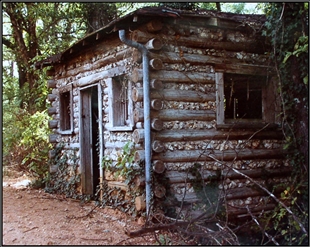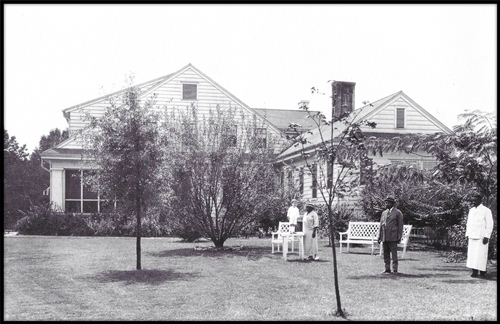|
Blue Spring Farm, better known as The Thompson
Place or T.C. Thompson Plantation & Farm, was originally owned by Mr. & Mrs. Thomas Carlyle Thompson,
proprietors of the Siluria Cotton Mills.
The Thompson house, which resembled a small mansion,
consisted of a downstairs and an upstairs, had a large library with plenty of
books, a well-furnished living room, a dining room with a crystal chandelier, a
huge kitchen and breakfast nook, five bedrooms with each containing closets and
bathrooms, a laundry room, storage rooms, and a large front porch that was
enclosed and furnished with wicker furniture. Marble floors were on the front
porch and in each bathroom as well as in the kitchen and breakfast nook.
The house was heated by steam, and it also had
fireplaces. In the cellar of the house was a steam furnace, which burned coal. A
truck would arrive regularly to bring a load of coal and drop it down the coal
chute into a coal room, where it was conveyed into the furnace.
Behind the house was a swimming pool that was built about
1926, which has been said to be one of the first in the southeast. The tile,
which was around the edge of the pool was some of the same tile that was used in
the Morris Hotel, constructed by Mr. T.C. Thompson in Birmingham, Alabama. There
was also a small wading pool at one end of the large pool. Shelby County Reporter-Democrat, dated Thursday, September 13, 1951, "Youth Week at Siluria Baptist church ended last
Friday night with a swim party at the home of Mr. and Mrs. Homer Brandenberg. Members of the church feel that Youth Week was quite a success."
There were other buildings located on the property. A log
cabin was located at the side of the house and was used as a private retreat for
family members. A cottage and garage were located at the front driveway. A
greenhouse, outside laundry, servant houses and farm buildings were located at
the rear of the house.

A cemetery was located on
the property with graves that dated back to their birth of 1787 and death before
the Civil War era. Some of the very early employees of Siluria Cotton Mill
Company were buried in this cemetery. However, many of those grave markers have
been destroyed.
In 1925 a Grade "A" Dairy was installed. In 1926 Adam
Olin Riser, Jr., 1898-1992, son of Adam Olin Riser, Sr. and Eula Seaman, and a
nephew to Mrs. Julia N. Thompson, planted a thirty acre peach orchard. The
peaches soon became famous and were being shipped to many places. Literature
about the peaches, where they were grown and packed, was placed in each basket.
There were many pecan trees on the farm too. The Shelby County Reporter,
dated June 17, 1926, "Interesting Developments On Blue Spring Farm, County Agent
Lauderdale tells of interesting developments on Blue Spring Farm owned by Mrs.
T.C. Thompson of Siluria, president of Buck Creek Mills. Five high grade
Southdown ewes were bought at the sheep sale in Montgomery as the beginning of a
flock of sheep to be developed later. A pure bred ram will be bought soon to
head the flock. Blue Spring Farm already has a fine herd of dairy cows and some
fine hogs. The development of sheep raising will make it one of the leading
livestock farms in Shelby County. Mrs. Thompson is also greatly interested in
trying out her section of the county in fruit growing and with that object in
view recently had planted out 3,000 peach trees and about 200 apple trees. These
trees were bought carefully from good stock, planted in ground that was well
prepared and they are being properly cultivated. One hundred pecan trees have
been planted this spring also. Mr. Olin Riser who owns large farming interests
in Talladega county and who is an Auburn graduate in agriculture is
superintendent of Blue Spring Farm and in charge of its operations. Mr. W.F.
Stroud, vice president and manager of Buck Creek Mills is greatly interested in
poultry and is developing a modern poultry plant on his farm near Siluria. The
poultry houses have been built and incubators and brooders provided. The flock
consists now of 150 white Leghorn hens and several hundred baby chicks were
bought this spring. It is the plan to increase the flock to 1000 hens."
In December 1946, Clyde (Bridges) Walton purchased this
farm consisting of 678 acres from Benjamin Louis Hinkle, 1881-1971, and his
wife, Lucy (Jones) Lowery Hinkle, 1894-1990. Clyde (Bridges) Walton, 1898-1991,
was the daughter of Lucine Marceline Bridges and Amanda Louisa Eudy. Her
husband, John Anderson Walton, Jr., 1895-1968, was the son of John Anderson
Walton, Sr. and Lula Bankston, and he was a "first cousin, four times removed"
to
George Walton,
1740-1804, one of America's Founding Fathers who signed The Declaration of
Independence. John A. and Clyde Walton were my wife's grandparents. My wife,
Diane (Brandenberg) Seales, lived in the Thompson house beginning at the age of
4 months and grew-up on this
farm. Today, the houses are all torn down and the peach orchard has been
destroyed. However, Diane and Bobby Joe Seales still live on a portion of the farm, in one of the
several residential subdivisions that were built. Charlotte, my wife's sister,
hanging in her dining room is the crystal chandelier that was once was in the
dining room of the Thompson house. Also, the tile that was once around the edge
of the swimming pool was placed on the face of the fireplace in the "new" home
in 1963 of Homer L. and Bessie (Walton) Brandenberg located at 1129 4th Avenue, S.W. in
Alabaster.
In Memory
Bessie Marie Walton Brandenberg ... January 14, 1925 ~ June 14, 2000
Homer Lewis Brandenberg ... Setember 16, 1924 ~ May 3, 2008
Clyde Bridges Walton ... April 14, 1898 ~ January 30, 1991
John Anderson Walton, Jr. ... September 16, 1895 ~ February 25, 1968
Copyright - Bobby Joe & Diane Seales - 2000
|


